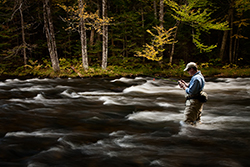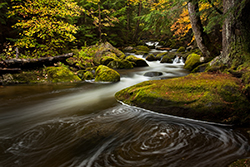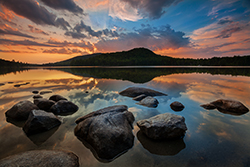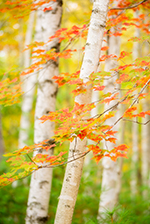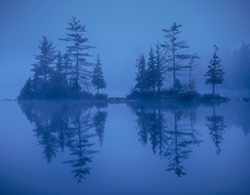
|
|
|||||
|
Featured Photographer, March 2018: Kurt Budliger
We are happy to have Kurt Budliger as our featured guest photographer this month. We appreciate that he gave us some of his time and generously shared his beautiful photography with us! Please visit his links to see more of his work, and to let him know you enjoyed this interview. :: How did you end up in photography, and more importantly how did you end up in Vermont doing photography? Like many, my door into photography was opened by a loving and visionary family member. When I was graduating from Colorado State University back in the early 90s my parents gave me a 35mm camera and a couple of introductory kit lenses. I was a natural resources major with a concentration in interpretation and environmental education and my father thought it would be a good idea for me to have a way of documenting natural history to use in slide talks and lectures. At the time I was also spending as much time as possible in the backcountry hiking and climbing and started carrying the camera with me to document my adventures. The real tipping point was spending a summer working at a backcountry lodge as a naturalist guide in Alaska. I loved taking landscape photographs and the quality of light during the summer in Alaska was amazing. Unfortunately, I had no idea what I was doing and no way of getting film developed while at the lodge, so the feedback loop was extremely slow. When I returned to the lower 48 and got my film developed I was sadly disappointed with my results. It was clear I had a lot to learn. At that point I was extremely fortunately to meet a new friend who would also become one of my most influential mentors. The next few years found me working in environment ed, traveling as much as time and money would allow and photographing as much as possible. I also decided to pursue the big bucks so I went to graduate school to get a masters in education and became a public school teacher. At the time I was living in the Adirondacks and there just weren't any jobs when I was finishing my degree program so that's how I ended up in Vermont back in 1999. I spent the next 8 years or so teaching middle school science in northern Vermont all the while photographing and traveling as much as time would permit in order to build a stock archive of slides to break into the business of professional nature photography; because that's how you made money in those days... :: You've taught at a lot of different levels from middle school, college, and privately with different clients…can you talk about the challenges and differences each of these have…and maybe how you approach them? Well as you know there's a huge difference between teaching kids in public school and teaching adults, whether at the college level or during workshops and tours. School aged kids are a captive (not necessarily captivated) audience and there are inherently challenges with motivation and behavior as well as learning difficulties, and the bureaucracy of the public education system can be oppressive and soul crushing for even the most motivated and creative teachers. I enjoy teaching at the college level because for the most part those students want to be there and are far more motivated and responsible. However, I really enjoy teaching folks on my workshops and tours. It's the perfect teaching scenario for me; small groups, motivated and excited students, hands on experiential learning and I'm teaching the thing I'm most passionate about in the most amazing natural landscapes. What's not to love?! There is one fundamental criteria to being a successful educator no matter what age group you are teaching and that's being able to forge authentic and positive relationships with one's students. I genuinely enjoy meeting and getting know my students, learning what makes them tick, how they learn and helping them to grow as photographers. :: How have the advances in technology changed the way you work in terms of processing? Where do you draw the line with, how much is too much? Oh boy, to borrow a term from politics, it's the third rail of photography… Honestly, I have never put a lot of emphasis on the processing side of my photography. Of course, it's critical to the final presentation and of the image but I still approach every frame with the same ethos I had as a film photographer, get it as close to "right" in camera as possible. For me the biggest limitation, until recently with digital sensors has been in dynamic range. For years I continued to use graduated neutral density filters to overcome high dynamic range. I also would employ bracket and blend techniques when filters didn't quite cut it or if the results were not aesthetically pleasing. The past couple of years have seen significant improvements in sensor tech, particularly where dynamic range is concerned. I've been using a sony A7RII for the past couple of years and it has completely changed how shoot in the field. In fact, the dynamic range is so good that my grads haven't seen the inside of my camera bag in a long time. I've always preferred the shooting part of photography and actually don't particularly enjoy the processing part, which is probably why I have such a backlog of files to process in my archive. It used to bug me but now I try not to get all hot and bothered by the arguments over how much Photoshop and digital manipulation is too much. It's your work, do what you want. For my work however, I draw the line on swapping skies (not bracketed skies for dynamic range, but skies from other times and places) and "focal" or "perspective blending." I personally believe photography is about capturing authentic moments at a single focal length (despite the "limitations" of the optics), time and place. I will say that I personally feel there is an overreliance on fancy Photoshop techniques, often to mask or overcome shoddy composition. One negative impact of this is that many students and new photographers assume that all photographs require intense manipulations and that all photographers use them. I still maintain the philosophy that just because you can, doesn't mean you should. :: I really enjoy your whole portfolio for the quality, and diversity…but the fly fishing images I really love. What are the differences and challenges shooting fishing bring on. What is one piece of advice you would pass on to someone to help him or her shoot people fishing? Thanks Brian, I really appreciate the sentiment. My other great passion in life besides photography is fly fishing. In fact, I often joke that if I had to choose one over the other it would be fishing because it's not tainted by business and you can eat what you catch. For many years I never mixed photography with fly fishing because when I was on the water I just wanted to enjoy the act and experience of fishing. Some number of years ago that all shifted, (perhaps I'd caught enough fish) and I started intentionally making images of the lifestyle and art of fly fishing. I now find just as much pleasure in coming home with a great fly fishing image as I do catching a nice fish. Many of the challenges in shooting fishing are the same as shooting any other outdoor activity; weather, light, finding great subjects and of course making dynamic compositions. Perhaps the most obvious challenge is keeping your equipment safe and dry while wading around in fast moving, boulder-strewn rivers. I personally use a dry bag backpack that I've equipped with a small F-Stop ICU to keep the camera and lenses dry even if I take a tumble. One piece of really critical equipment is a good pair of waders and wading boots with excellent traction. For the most part I practice catch and release fishing so when shooting fish it's really important to keep them wet and not stress them when trying to get the shots. I'll usually have my anglers net the fish and keep the fish in the net under water so they don't get stressed while we set things up. Once everyone has their directions and we have a good background for the shot I'll have the angle gently lift the fish out of the water briefly while I get some frames. I also really like shots at water level so I'll often get the camera really low so the fish doesn't even have to come completely out of the water. There have been plenty of times where we released fish before I had the shot I really wanted just so we didn't harm the fish. :: It seems in the past couple years your travels are taking you to more far away places…how does hitting up some of these iconic global locations, differ in the way you approach them than those little intimate places in the Northeast where maybe not as many viewers are familiar with them? It's hard not to be influenced by the incredible images we've all seen from these iconic locations. I personally approach every location, whether it's new or familiar, with the same mindset; explore , get to know the place and see what gets me excited. It's funny because when I was starting out in photography, long before the modern internet and social media, there was sort of an unspoken code that the last thing you'd ever want to, or set out to do is take the same photograph as someone else. It's commonly referred to as comp stomping now. I always challenge myself to find something different, something new in every location I shoot. Rather than search for and set up on the "classic" or "standard" shot, I spend as much time as I can walking and exploring an area looking for something new and unique. And unfortunately, unless there is some exceptional light or atmospheric going on sometimes it just isn't there. That's one of the reasons I get as much, if not more, satisfaction from shooting my home area in VT and the northeastern US. There just aren't that many icons (although that seems to be changing) and you really have to immerse yourself in the landscape to sniff out good photographs. I often compare VT to an English Muffin, it's all about the nooks and crannies. Most of what I shoot here are intimate compositions and vignettes of the larger landscape. This landscape makes you work for shots and really teaches you to "see." And the reward is usually something that's totally unique to you. It's like skiing. If you can ski the east than everything else is a piece of cake. :: I think part of photography is the thrill of capturing a memorable image…and some times I see photographers talk about how they "left the camera in the bag, and just enjoyed the moment." I personally can't do that…if I put work into getting a shot and it doesn't pan out…I get pissed. Which school of thought do you side with…if you're on the "just enjoy the moment" side…how does one DO that being in the photography field? I'm with you. If I blow an opportunity or can't come up with a great composition during some epic lightshow or something I get pretty grumpy with myself. I think those folks that say they just left the camera in the bag are either lying or perhaps they're just better people than you and me. The latter is probably the truer statement. In all seriousness though, I think shooting in iconic or popular locations can really exacerbate this stress, especially in this hyper competitive Internet age. There's nothing worse than trying to compose your ideal shot when there are 20 or 30 other photographers all vying for the same real-estate, which is also one of the reasons I often prefer to photograph in my home state of VT. :: Your work in Vermont has personally put it on my list of places to visit…but I'm not sure a lot of people really know about it photographically…what is so special about your area for photography? Vermont is a very special place. It's small, intimate, extremely beautiful, surprisingly rugged and has the best beer in the country! However, as I expressed earlier, it's not an easy place to photograph well. You have to work for your shots here. The state is extremely rural so you can get off the beaten path and out into the landscape very quickly. For example, I live off a dirt road on 12 acres of forest but I'm only 7 miles from downtown Montpelier, which is the state capitol. Within a 30 min. drive I can be photographing wild mountain streams with waterfalls, myriad ponds and lakes, the shores of Lake Champlain and be at any number of mountain trailheads all leading to alpine summits. The entire population of VT is not even 700,000. I've read that there are well over 8,000 miles of dirt roads in the state so there is almost no end of opportunities to get off the beaten path and explore. Most photographers associate Vermont with autumn and fall foliage. There's no doubt that that is my favorite time of year to photograph VT. However, the other seasons can offer some amazing photographic opportunities, especially spring (late May is otherworldly). Probably the best part of photographing here is the lack of crowds. This is primarily because there aren't any real icons, except maybe the Jenni Farm in Reading, VT but there are plenty of other awesome farm scenes around if you're willing to explore a little. The vibe here is also another reason to visit. I've never lived anywhere else that has the same sense of identity, tight knit community and sense of stewardship for its land and people. :: Does having the option to photograph lifestyle shoots, fishing, and other non photographic projects free you up from not having to participate as much in the sometimes tumultuous world of landscape photography online? How do you personally view this community and the social media side of the business? I've been doing this professionally now for almost 13 years and my career has morphed and evolved the entire time, no two years ever being the same. In the past I would say most of my paying work was here in VT and now, especially the past several years most of my photography has taken me outside the state. In fact, I've been feeling a little disconnected from my local markets and I'm not all together sure that's a good thing. I've been reassessing my goals and trying to figure out where I want to be in 10 years and Vermont always plays big in that equation. As for the online world of landscape photography, yeah it's gotten tumultuous to borrow your term. I hate drama so I try to stay out of the weird stuff that goes on and just do my own thing. I have a love hate relationship with social media actually. Truth be known, I suck at social media self-promotion and have struggled to build a large audience. I was never the guy in class with his hand up looking to be called on and I probably wouldn't participate in social media much if it wasn't a good tool to reach potential clients. Although, I feel like it's getting harder and harder to reach people organically these days. I will say that I've met some great people through photography online, some of whom are my best friends now. Honestly, the more time I spend online or on social media the worse I feel about myself and my photography. As you probably know there is a growing body of social science that bares this out. The whole social media world, particularly where photography is concerned seems really shallow, soulless and increasingly corporate with everyone standing in a crowded room trying to shout over each other, all the while saying the same thing over and over. One of the reasons I love leading workshops so much is that it's real face-to-face interaction. I'm really curious to see where it goes during the next 10 years. :: What's the scariest thing that you've had happen to you on a photo shoot? I've been a backcountry enthusiast, outdoor educator and guide for a long time so I try not to take unnecessary or foolish risks when I'm in the field. Probably the scariest thing to happen when shooting landscapes has been almost getting wiped out by rogue waves or slipping off rocks when shooting along the coast. This past summer I almost got taken out by a car sized piece of ice while shooting on the black sand beach at Jokulsarlon in Iceland. Oh, and there was the time Ian Plant almost got me killed kayaking off the coast of Belize… :: What is your favorite piece of non-photographic gear and why? I would have to say that it's Starbuck Vias (instant coffee packets). I'm a total coffee hound, especially in the morning. It's sometimes hard to find good coffee while you're on the road and I always keep a few vias in my camera bag just in case. I love diners but diner coffee usually sucks. :: What is something you want people who view your work 50-years in the future to be able to recognize and still have and relate to? Boy I don't know… you're assuming anyone will actually see my work in 50 years. Hahahaha. I've always had a strong environmental conservation/preservation ethic in life and career. I was the first VT business to join 1% for the Planet back in 2005 and have been contributing 1% of my gross profits each year to organizations that work to protect and preserve wild lands. I also work with organizations like The Trust for Public Land to provide imagery that helps with the work they do, whether it's education, outreach or fundraising. So I'd like to think that in 50 years anyone that sees my work will walk away with a deeper sense of appreciation or more importantly a desire to visit some of these amazing landscapes. It's awful hard to imagine or expect people to care about something they don't know, and they won't know if they don't go… :: What photo are you most proud of, and what went into creating it? That's like picking your favorite child… I guess if I had to pick one it would be the shot of the red barn with the insane mammatus clouds at sunset. It wasn't a particularly difficult shot to make, straightforward composition and a blend for dynamic range. The fun part of the shot was the chase. I had wrapped up shooting elsewhere and returned to the car as a huge thunderstorm started to roll in. The clouds were ominous and I thought if I could get out in front of the storm I might get some cool shots. We don't often get clouds like that in the northeast. I raced east toward some farm country I thought would make a nice vantage point from which to shoot. Unfortunately, the storm was too fast to outrun and I couldn't get in front of it. The radar showed that it would move out quickly and it was close to sunset so I waited around to see what would happen as it passed. Sure enough, it paid off. The storm passed quickly and a large gap opened to the southwest allowing the setting sun to illuminate the still ominous clouds. The shot wound up running on the cover of Vermont Life Magazine later that year. It was an issue that represented a new brand and contemporary overhaul of the magazine so I was particularly proud of the publishing credit. :: What was one misconception you had about the photography industry before you became a full time photographer…what is one thing you feel like new photographers fail to realize about the industry, and what advice do you have for them? I think prior to leaving my teaching career and becoming a full time working photographer I was a bit naive about how fluid the industry was and continues to be. I started my career shooting film and then seemingly overnight digital technology replaced film and then the internet blew up when broadband technology became commonplace. That was a total game changer. There has never been a year that I've done things the same way as the year prior. I think it's extremely important to diversify and stay flexible. I'd also encourage new photographers to stay as debt free as possible. Don't borrow to purchase equipment, look at used gear or renting as an alternative. Keep the day job or scale it back to part time until you've got enough income from your photography to make a smooth transition. And most importantly, shoot what you love and be true to yourself. |
"I think it's extremely important to diversify and stay flexible. I'd also encourage new photographers to stay as debt free as possible. Don't borrow to purchase equipment, look at used gear or renting as an alternative... And most importantly, shoot what you love and be true to yourself."
Photographer Spotlight Interviews
|
|
 |
Other Cool Stuff→ Past Workshop Photos → 72dpi.com → How-To Articles → Photographer of the Month |
 |
Contact Us→ Contact Us → About Us → Site Map |
© 2009-2024 Aperture Academy, Inc.

